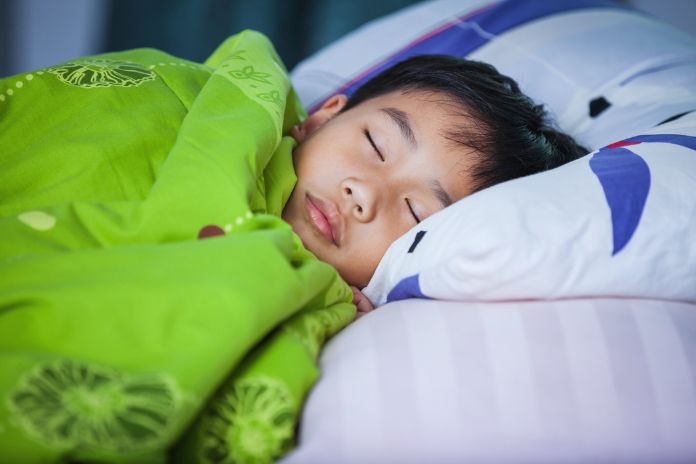Sleep is a fundamental part of children’s day and plays a vital role in promoting optimal psychological and physical health for correct growth. Sleeping the proper hours a night, having a regular sleep-wake rhythm, and a good night’s rest are, in fact, all factors that positively impact the well-being of children and adolescents.
- Sleep, in particular, allows children to:
- Grow and develop in the right way ;
- Improve school learning ;
- Strengthen memory ;
- Making synapses (i.e., the points of contact between nerve cells that propagate impulses to the organism) more efficient;
- Strengthen immune defenses.
Reasons Why Children Don’t Sleep
It often happens that children do not want to sleep, that they wake up several times during the night with difficulty falling back to sleep, or that they have nightmares or night terrors that prevent them from sleeping for the correct hours.
In Young Children (Newborns And Infants)
becoming increasingly aware of themselves and their relationship with their parents can cause a state of temporary anxiety that can make it difficult to fall asleep or can generate nightmares. However, restless sleep is not necessarily a bad sign. Sometimes, in fact, small children can have difficulty sleeping if they are very excited ( adrenaline ) from the new activities and discoveries of the day; their brain continues to be “stimulated” even at night. Furthermore, the teething phase is excruciating for many children, and the growth of a new tooth can disturb the sleep of the little one who, for the first time, feels a foreign body in the mouth. In general, therefore, fragmented sleep in newborns and infants is an entirely normal phenomenon, which can depend on essential needs such as hunger, thirst, physical pain (e.g., teething, minor colic, etc.), or even on request for human contact and reassurance from the parent.
In children Aged 3-5 Years
It often happens that children of this age, after being put to bed by their mother or father, wake up and immediately call their parents because they are afraid of the dark. Don’t worry; it is an entirely normal phase in children’s development, which, in many cases, is due to the greater awareness of becoming a little more independent (mum and dad leave the child alone to sleep). Going to bed and falling asleep can represent a “detachment” from the parents for the child, and this can frighten him, especially during the night’s rest. The parents’ task, in these cases, is to help their child overcome these moments, to grow and acquire more and more independence by staying close to him and making him understand that nothing happens if he stays sleeping for a few hours in his bed halo.
In Children Aged 6-10 Years
Older children often exhibit active resistance to sleep, that is, a genuine attitude of rebellion, almost defiance, towards their parents. In fact, if the child has spent a day full of intense activities, if the time he spends with his parents is reserved only for the evening hours, or if he has worries or anxiety about the school day that awaits him, he may refuse to sleep. In this case, it is best for parents not to give in to provocations but to explain to their son or daughter why she needs to rest and what happens if she doesn’t, listening to him/her and reassuring him/her.
In Adolescents
The combination of some internal factors, such as the high “hormonal storm” typical of this phase of growth, and external factors, such as social relationships with friends, classmates or sports mates, interests, going out, etc., can alter the sleep-wake rhythm of children, who will tend to fall asleep late in the evening and, consequently, wake up late in the morning. It is best not to underestimate this attitude as it can sometimes lead to natural insomnia: read this article to find out how to combat it.
What To Do When Kids Don’t Want To Sleep?
Managing the tantrums and cries of children who don’t want to sleep is not easy, but you can help yourself by following these two tips.
- Create a bedtime ritual.
- For example, the child must brush his teeth, lie down with his favorite stuffed animal, and listen to a bedtime story. The toys that children use to sleep are significant objects that give them security and reassurance when they have to leave their parents to rest. In a certain sense, they must be ready to “lose control.” The same reassurance function covers the bedtime story, the lullaby, reading a book, and the kiss of mum or dad who tucks you in.
- Take care of sleep hygiene, but also the baby’s nutrition, as some foods provide beneficial nutrients for the sleep-wake cycle and can represent a precious natural aid.
- Calcium, magnesium, and B vitamins promote relaxation of the body. Still, the amino acid tryptophan, in particular, encourages the production of melatonin, a hormone that regulates the circadian cycle (biological clock). Foods that contain all these promising nutrients are, for example, milk and its derivatives, such as Grana Padano DOP. This cheese is a concentrate of milk; it provides the most significant quantity of calcium among the most commonly consumed cheeses, an essential mineral for the development of children and teenagers; it also contains proteins of high biological value (including tryptophan) and is rich in vitamins such as A, those of group B (B2 and B12) and minerals essential for the immune defenses and brain activity of children, such as zinc, selenium, and magnesium. Therefore, drinking a small glass of warm milk a couple of hours before going to bed or consuming grated Grana Padano DOP (even instead of salt ) in baby food, first courses, or vegetable soups can help children and adolescents to be more relaxed, more inclined to sleep, obtaining a good restful sleep.
What To Avoid Going To Sleep
If you have children who struggle to fall asleep and throw tantrums when it’s time to go to bed, you can implement some strategies to solve the problem. We need to create the environment and conditions that protect and guarantee children’s sleep as much as possible. It is essential to maintain sleep hygiene and create a healthy routine before going to bed. The factors that can disturb the sleep of children and teenagers – therefore to be avoided – are:
- Games and activities that require psychophysical excitement, such as fighting, games in which you have to run, play football, in which competition is created, etc. All activities that “overactivate” the brain rather than resting it. It is, therefore, better not to do them after 5 pm.
- The use of TV, video games, smartphones, and tablets, as these devices create excessive brain stimuli that disturb sleep quality and duration. Furthermore, the blue lights emitted by these electronic devices can inhibit the release of melatonin (sleep hormone) and, therefore, make it more difficult to fall asleep.
- Noisy and bright environments can prevent good rest. It is better to prefer a room that is as dark and quiet as possible. For children who are afraid of the dark, it is possible to put a small light in the bedroom, which will make them feel safer even when falling asleep.
- They are drinking too many liquids before going to bed, as the child may wake up in the night needing to go to the bathroom and then have difficulty falling back to sleep. Avoid drinks, such as cola or tea, that contain caffeine, theine, or other stimulants, even in the sugar-free version. Remember that even if drunk in the morning, the exciting effect can persist until the evening and night.
Read Also: Sleep Apnea And Snoring Are Insufficient For The Heart




